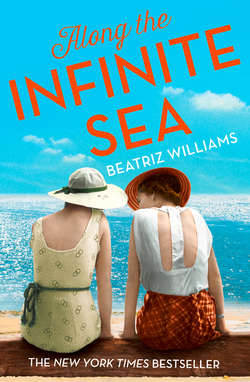Читать книгу Along the Infinite Sea: Love, friendship and heartbreak, the perfect summer read - Beatriz Williams, Beatriz Williams - Страница 25
6.
ОглавлениеOf course, my full name was much longer.
I was christened Annabelle Marie-Elisabeth, Princesse de Créouville, a title bought for me by my mother, who married Prince Edouard de Créouville with her share of the colossal fortune left to her and her sister by their father, a New England industrialist. Textiles, I believe. I never met the man who was my grandfather. My father was impoverished, as European nobility generally was, and generously happy to make the necessary bargain.
At least my mother was beautiful. Not beautiful like a film star—on a woman with less money, her beauty would be labeled handsome—but striking enough to set her apart from most of the debutantes that year. So she married her prince, she gave birth to Charles nine months later and me another four years after that, and then, ooh la la, caught her husband in bed with Peggy Guggenheim and asked for a divorce. (But everybody’s doing it, my father protested, and my mother said, Adultery or Peggy Guggenheim? and my father replied, Both.) So that was the end of that, though in order to secure my father’s cooperation in the divorce (he was Catholic and so was the marriage) my mother had to leave behind what remained of her fortune. C’est la vie. We moved back to America and lived in a modest house in Brookline, Massachusetts, summering with relatives in Cape Cod, until Mummy’s appendix burst and it was back to France and Saint Cecilia’s on the storm-dashed Brittany coast.
“But that is medieval,” said Stefan, to whom I was relating this story a week later, on a pair of deck chairs overlooking a fascinating sunset. He was still in pajamas, smoking a cigarette and drinking a dry martini; I wore a lavender sundress and sipped lemonade.
“My father’s Paris apartment was hardly the place for an eleven-year-old girl,” I pointed out.
“True. And I suppose I have no right to complain, having reaped the benefit of your convent education. But I hate to think of my Annabelle being imprisoned in such a bitter climate, when she is so clearly meant for sunshine and freedom. And then to have lost such a mother at such an age, and your father so clearly unworthy of this gift with which he was entrusted. It enrages me. Are you sure you won’t have a drink?”
“I have a drink.”
“I mean a real one, Annabelle. A grown-up drink.”
“I don’t drink when I’m on duty.”
“Are you still on duty, then?” He crushed the spent cigarette into an ashtray and plucked the olive out of his martini. He handed it to me.
I popped the gin-soaked olive into my mouth. “Yes, very much.”
“I am sorry to hear that. I had hoped, by now, you were staying of your own accord. Do you not enjoy these long hours on the deck of my beautiful ship, when you read to me in your charming voice, and then I return the favor by teaching you German and telling you stories until the sun sets?”
“Of course I do. But until you’re wearing a dinner jacket instead of pajamas, and your crutches have been put away, you’re still my patient. And then you won’t need me anymore, so I’ll go back home.”
He finished the martini and reached for another cigarette. “Ah, Annabelle. You crush me. But you know already I have no need of a nurse. Dr. Duchamps told me so yesterday, when he removed the stitches.” He tapped his leg with his cigarette. “I am nearly healed.”
“He didn’t tell me that.”
“Perhaps he is a romantic fellow and wants you to stay right here with me, tending to my many needs.”
Suddenly I was tired of all the flirting, all the charming innuendo that meant nothing at all. I braced my hands on the arms of the deck chair and lifted myself away.
“Where are you going?” asked Stefan.
“To get some air.”
The air at the Isolde’s prow was no fresher than the air twenty feet away in the center of the deck—and we both knew it—but I spread my hands out anyway and drew in a deep and briny breath. The breeze was picking up with the setting of the sun. My dress wound softly around my legs. I wasn’t wearing shoes; shoes seemed pointless on the well-scrubbed deck of a yacht like this. The bow pointed west, toward the dying red sun, and to my left the water washed against the shore of the Île Saint-Honorat, a few hundred yards away.
I thought, It’s time to go, Annabelle. You’re falling in love.
Because how could you not fall in love with Stefan, when he was so handsome and dark-haired, so well read and well spoken and ridden with mysterious midnight bullets—the highwayman, and you the landlord’s dark-eyed daughter!—and you were nursing him back to health on a yacht moored off the southern coast of France? When you had spent so many long hours on the deck of his beautiful ship, in a perfect exchange of amity, while the sun glowed above you and then fell lazily away. And it was August, and you were nineteen and had never been kissed. This thing was inevitable, it was impossible that I shouldn’t fall in love with him.
For God’s sake, what had my brother been thinking? Did he imagine I still wore pigtails? I thought of the woman who had visited Stefan that first day, who had held Stefan’s hand in hers, tall and lithe and glittering. She hadn’t returned—women like her had little to do with sickrooms—but she would. How could you not return to a man like Stefan?
Time to go home, Annabelle. Wherever that was.
I closed my eyes to the last of the sun. When I turned around, Stefan’s deck chair was empty.
